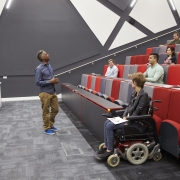School's out for summer...but here's how disabled students starting uni in autumn can get the right support
Alex.Barker | 07 Aug 2017It seems like the summer holidays have just started, but it won't be too long before new students are going off to university for the first time. In 2016, Disability Rights UK came up with some handy guidance for disabled students about what Adjustments could be made by universities to help those students with a disability. It isn’t exhaustive, but it very long and does give some really useful hints and tips on what to do in order to accommodate students who might have additional needs and provide a more inclusive service.
The guidance is split into different categories. So for example, under the General heading the guidance talks about university staff having disability awareness training so they are better informed to support students who might have additional needs. Another category relates to General Access requirements. So for example you might require a longer time to complete an exam paper, and you may also need some rest breaks being built in so you can manage symptoms of fatigue more effectively.

The last category relates to disability specific needs. So, for example, if a student has vision loss, they may need specific support in making hand-outs easier to read. So they might need to recieve hand outs on different coloured paper, or in larger print.
Those with hearing loss might need some of the following:
- 'Remote captioning eg, using Skype to access a palantypist
- Changing the language of exam papers if you’re pre-lingually deaf
- Induction loop system in lecture halls and seminar rooms
- Radio or infrared microphone system
- Textphone (e.g. minicom) at home, in the Students’ Union and/or somewhere easily accessible at the college
It's hard to know how many higher education students claimed Disabled Student Allowance (DSA) across the board last year. AbilityNet carried out assessments for approximately 1800 students last year with a view to them receiving DSA. Some of the students we assessed had conditions such as dyslexia, or dyspraxia, others had depression and anxiety issues, as well as hearing and sight loss and it the difference that can be made with some simple help, is extraordionary.
In 2016 the Association of Colleges reported that between 2015-2016 some 2.9 million people were educated or trained at college. Many of those students will have some sort of impairment that needs support.
It is one thing to explain on an enrolment form that you have a disability but another entirely for the education institution to put measures in place to help you. Under the Equality Act 2010, they must make reasonable adjustments to support you.
Disabled students don’t want to shout about their disability, so it does make sense for staff to be well briefed on the additional requirements they might have. They also wants to be seen as individuals, so just because a member of staff helped a student with dyslexia last year and they have another student who has dyslexia this year, both might have had different requirements.
If you have students, or are a student who struggles with their IT and need some advice on adaptive equipment, you can always Ask Alex (me) AbilityNet's Advice and Information officer. I used IT equipment all throughout college and university to produce work of a high standard and as I don’t have all my fingers it makes writing really difficult.
How can we help?
AbilityNet provides a range of services to help disabled people and older people.
Call our free helpline - our friendly, knowledgeable staff will discuss any kind of computer problem and do their best to come up with a solution. We’re open Monday to Friday from 9am to 5pm on 0800 048 7642.
If you are in work your employers have a responsibility to make Reasonable Adjustments.
For more details on this have a look at abilitynet.org.uk/ctod and cleartalentsatwork.com.
Arrange a home visit - we have a network of AbilityNet ITCanHelp volunteers who can help if you have technical issues with your computer systems. They can come to your home, or help you over the phone.



